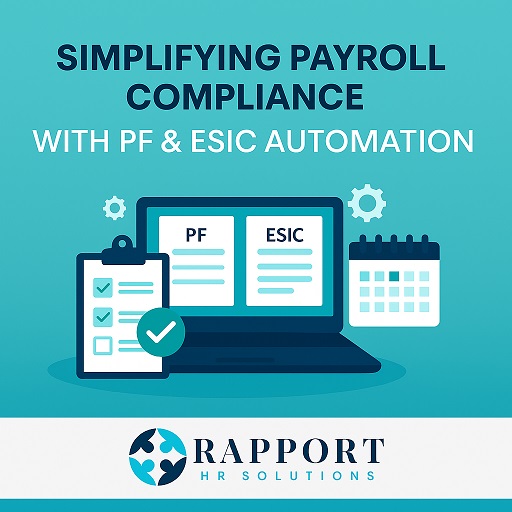
Simplifying PF and ESIC Compliance | Payroll Compliance Management in India
Simplifying PF and ESIC Compliance: Building a Strong Payroll Compliance Framework
Payroll compliance management is one of the most critical yet complex aspects of business operations. Whether you run a startup or manage a large enterprise, ensuring compliance with statutory laws like EPF (Employees’ Provident Fund) and ESIC (Employees’ State Insurance) can be both time-consuming and challenging.
Frequent regulatory changes, complicated calculations, and strict filing timelines often make compliance a daunting task. Even a small oversight can lead to penalties, delayed benefits, or reputational risk. This is why organizations today are turning toward expert compliance partners and automated payroll solutions to ensure accuracy, transparency, and efficiency.
In this article, we explore how businesses can simplify PF and ESIC compliance, strengthen their payroll systems, and establish a reliable compliance framework.
Why Payroll Compliance Matters
Payroll compliance ensures that an organization’s payroll activities follow statutory rules and employee welfare laws. In India, the two most important components of statutory compliance are PF and ESIC.
1. Provident Fund (PF) Compliance
The Employees’ Provident Fund (EPF) is designed to help employees build long-term savings for retirement. Both employer and employee contribute a fixed percentage of the salary each month.
Proper PF compliance includes accurate deductions, timely remittance, and submission of returns through the EPFO portal. Non-compliance can lead to penalties, interest, or even prosecution, apart from damaging employee trust.
2. Employees’ State Insurance (ESIC) Compliance
The ESIC scheme provides medical, sickness, maternity, and other benefits to employees earning below the prescribed wage threshold.
Employers are responsible for deducting employees’ contributions, adding their own share, and depositing them with ESIC authorities on time. Any lapse may delay employee benefits and attract penal consequences.
Together, PF and ESIC compliance form the backbone of employee welfare and payroll governance in India.
Common Challenges in PF and ESIC Compliance
Despite their importance, many businesses face recurring challenges such as:
Frequent regulatory changes: Keeping track of amendments, notifications, and circulars can be difficult.
Complex calculations: Determining wage ceilings, exclusions, and exemptions often requires expert knowledge.
Manual processing errors: Spreadsheet-based calculations and filings increase the risk of inaccuracies.
Data security concerns: Safeguarding sensitive employee information like UAN, Aadhaar, and ESIC numbers is crucial.
Administrative delays: Verification and approval processes can extend compliance timelines unnecessarily.
For HR and payroll teams, these factors can lead to missed deadlines, additional costs, and compliance stress.
How Digital Solutions Simplify PF and ESIC Compliance
Technology is transforming the way businesses handle compliance. Modern payroll and compliance platforms simplify complex statutory obligations through automation, integration, and intelligent validation.
1. Automated Calculations and Validation
Automated systems calculate PF and ESIC contributions based on the latest rules, ensuring accuracy. They flag issues like invalid UANs, incorrect wage inputs, or missing records before filing.
2. Real-Time Regulatory Updates
Integrated compliance tools keep track of government notifications and update rules automatically — reducing the need for manual intervention.
3. Secure Data Management
Cloud-based systems store employee records (UAN, ESIC, Aadhaar, PAN) safely, ensuring confidentiality and easy retrieval.
4. Seamless Online Filings
Smart tools enable direct filing with EPFO and ESIC portals, eliminating redundant steps and saving time.
5. Employee Self-Service and Transparency
Employees can access their contribution statements, download payslips, and raise compliance-related queries through integrated helpdesks — improving communication and trust.
By adopting digital compliance tools, companies minimize manual errors, reduce dependency on physical paperwork, and ensure end-to-end compliance with statutory deadlines.
Best Practices for Efficient Payroll Compliance
Even with modern systems, following these best practices ensures long-term compliance success:
Timely Remittances and Filings
Always remit PF and ESIC contributions within due dates. Use automated reminders to avoid penalties.
Validate Employee Data
Maintain accurate employee master data — including documentation, UANs, ESIC numbers, and contribution history.
Train HR and Payroll Teams
Regular training ensures teams stay updated with statutory requirements and system enhancements.
Conduct Periodic Compliance Audits
Internal reviews help identify mismatches, missed filings, or unapproved DSCs, reducing audit risks.
Partner with Experienced Compliance Experts
Engaging professional consultants or service providers ensures timely guidance, risk management, and adherence to ever-evolving laws.
The Future of Compliance Management
The future of payroll compliance lies in automation, intelligence, and integration.
Emerging technologies like real-time validation, cloud-based dashboards, and data-driven analytics will help organizations monitor filings, payments, and exceptions more effectively.
Soon, AI-powered compliance platforms will automate statutory updates, flag inconsistencies instantly, and generate actionable insights for employers — ensuring compliance is both smart and stress-free.
Conclusion
In today’s digital era, PF and ESIC compliance go beyond legal formalities — they reflect a company’s commitment to employee welfare and transparency.
By embracing automated payroll compliance solutions and following best practices, businesses can save time, reduce risks, and ensure uninterrupted employee benefits.
At Rapport HR Solutions, we believe that effective compliance management isn’t just a responsibility — it’s a strategic advantage that drives trust, accuracy, and growth.
